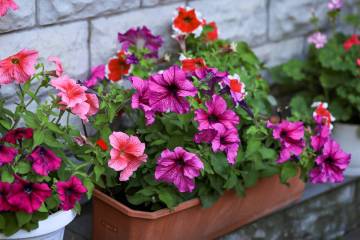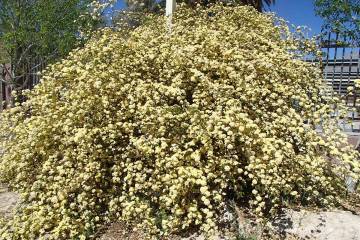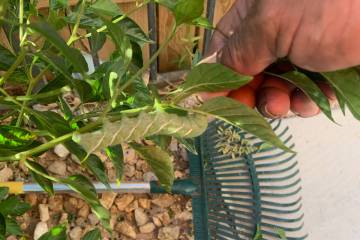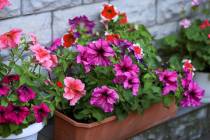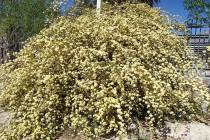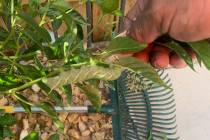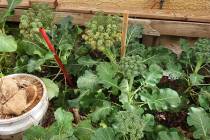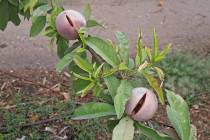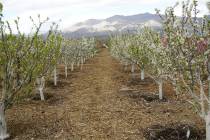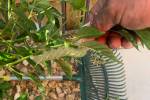City’s small business offers wealth of information via vegetables
Bryan Vellinga was on a path to become an accountant when he took a horticulture class and discovered his green thumb. Vellinga owns North Las Vegas-based Garden Farms, a company that not only plants personal gardens in people's backyards but also teaches them to care for the plants. Vellinga said his goal is to teach his clients how to tend their own gardens within a year.
In late December, Vellinga said he had about 40 garden clients, but it fluctuates. He started in landscaping in the valley, but when business declined with the housing market, he had to come up with a new game plan. He launched a vegetable garden business in early 2010. Personal gardens were a natural fit, he said. He and his family have raised everything from cantaloupe to peas in their own garden for more than 15 years, and people always asked how they were able to have such a fruitful garden in the desert.
"My wife and I thought, 'You know, we should really start teaching people how to do this,' " he said. "Part of what is so fun is seeing people change the way they think about food."
But it is not just homeowners who are interested in his services. Vellinga works with several schools to teach children where food comes from and the long-term enjoyment of a garden.
School gardens present an additional challenge: funding. Vellinga works with the schools to promote crowd-funding campaigns and to pay for the garden and their fees. He said he encourages schools to raise between $5,000 and $10,000 to "put in a really nice garden" but has worked with less. Most of the funding comes from local parents and businesses donating online, he said.
He would like to see the program expand statewide.
"Wouldn't that be a cool thing to say it happened here," Vellinga said. "The city of excess to become a city of sustainability."
Vellinga and his team installed a courtyard garden in Detwiler Elementary School in North Las Vegas, planting everything from carrots to zucchini.
"We typically try to go with elementary schools, trying to teach them younger, so that they'll keep it with them," he said. "By the time they become an adult, with any luck, they'll have a garden of their own. They can supplement their grocery bills."
Other staples in a garden like the one at Detwiler Elementary include radishes, beets, lettuce, tomatoes, garlic, cabbage, turnip, kale and squash.
Detwiler principal Ryan Lewis said every class at the school has been out to the garden at least once, and the children get to eat what they grow.
"Planting, harvesting or eating, in some shape or form, they get to be part of the process," Lewis said. "They come enjoy the green space. We have no air conditioning sometimes or no heat, so they come out here and use it." This spring, each fifth-grader is to decorate a tile and add it to the wall behind the garden to leave his legacy, Lewis said.
Vellinga said that for a school garden to be successful, the principal needs to be supportive. With long periods of school breaks, he said he relies on good communication with the principal to ensure the garden is looked after.
There are some key tips to gardening in the desert, Vellinga said. First, any farm in Southern Nevada has to have irrigation, he said, and soil must be replaced.
"Trying to grow vegetables in our natural soil can be done, but you would have to amend soil so drastically that it's cheaper to buy new," he said. "Our soil is really quite bad."
For beginners, he suggests growing zucchini as a starter.
Vellinga said that to plant a vegetable garden, the gardener must start early.
"The problem is our summers are so hot that people start planting gardens in May," he said. Tomatoes, for example, should be in the ground by March. "Timing is everything; it's the biggest secret," he said. "If you plant the plant at the right time of the year here, you're going to succeed if you have sunshine."
Vellinga said the company's most popular size is the 4-by-8-foot garden for $900. The price depends on the size, and some people have spent as much as $20,000 for a vegetable garden on their property.
Carrie Jones, originally from Florida and now a Centennial Hills resident, said she missed the taste of fresh vegetables.
"You can't buy anything in town that tastes remotely like this, so fresh," she said. She is a self-proclaimed "tomato person" and has been quite happy with the success of her Garden Farms plot. She had tried to plant a garden before in the shade without much success.
"I like to be hands-on, and I like to teach the kids, too," Jones said. "They like to plant new stuff and watch it grow, and they love all the bugs."
For more information on Garden Farms, visit mygardenfarms.com.
Contact Centennial and North Las Vegas View reporter Laura Phelps at lphelps@viewnews.com or 702-477-3839.




